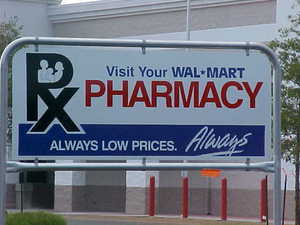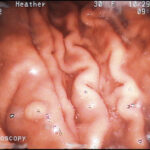Gastric bypass patients are typically advised against taking NSAIDS, or non-steroidal anti-inflammatory drugs. NSAIDS put you at risk for ulcers. They do that to everyone, not just gastric bypass patients. But ulcers are particularly dangerous to us. If you get an ulcer in your pouch, even a small one, since your pouch is a lot smaller than a normal stomach, it will cover a much greater percentage of your pouch. If you get an ulcer in your old stomach, docs can’t even do an endoscopy to see it. They’d have to do surgery. Also taking a medication designed to coat the stomach wouldn’t help an ulcer in the old stomach because nothing you take by mouth goes in there.
We really, really don’t want an ulcer.
NSAIDS can cause ulcers because they cause the lining of the stomach (the old stomach and the pouch) to thin out. This does NOT happen when the medication enters the pouch or touches the pouch. It happens when the medicine enters your blood stream. That’s why you can get ulcers in your old stomach. NSAIDS taken by mouth don’t touch the old stomach but can still cause ulcers there.
Any way you take an NSAID – pill, liquid, shot, IV, patch, gel – it gets into your blood stream. If it does not get into your blood stream, it will not give you any pain relief or relieve inflammation. Many docs don’t understand this, though I don’t know why since they have to take pharmacology in medical school.
Many docs that are not bariatric surgeons also don’t know gastric bypass patients should have not NSAIDS so be very vigilant about what other docs try to give you. I finally started saying I am allergic to NSAIDS. They seem to listen to that more.
Some surgeons say it’s OK to take NSAIDS on a very limited basis if you really need them as long as you also take Nexium or something like that to help protect your stomach. Others say it’s never worth the risk. A few say it’s OK to take them whenever you want, but I think they are nuts. But what I really think is that we need to weigh the benefits of taking them against the risks. Is the pain of your bad back or menstrual cramps or whatever worse than the pain of an ulcer would be? If so, take the NSAID. But take it with something to protect your tummy.
Now, how likely it is that taking NSAIDS, especially rarely, will cause an ulcer, no one can say. I know people that took just one dose and got an ulcer. I know people that took them many times and had no problem. So it’s just a matter of whether or not you want to chance it.
Patient Survey
I recently conducted an informal survey of gastric bypass patients to find out what they’d been taught and believed regarding NSAIDS and whether or not they used them. It looks like most docs do tell patients not to take them but a few do not. Frightening to me is that fact that one doc said his patients can just take them anytime they want. It also concerns me how many people were not told the no NSAIDS rule also applies to NSAIDS by IV or injection. It was interesting to me that most people don’t take them at all, even if their docs said it was OK once in a while.
Were you advised by your surgeon not to use NSAIDS after RNY?
Eighty percent answered yes, they were advised not to use them. Four percent were advised not to use them but not until they’d already had surgery. Eight percent were not advised either way about them and one respondent was told it was just fine to use them whenever she wanted.
Did your surgeon explain why you should not use them?
Sixty-eight percent did receive an explaination, while 20 percent did not. Eight percent could not remember if their surgeon explained the rationale beyond the advice or not. One person said she was told taking NSAIDS would permanently alter her anatomy, which is not true at all.
Did your surgeon explain that this includes not taking them orally, by IV or by injection?
Only 44 percent of respondents reported being told this. Thirty-six percent said they were not informed. Eight percent said their surgeons did not specify one way or the other but they just assumed he or she meant not to take NSAIDS in any form. One person said she had no idea NSAIDS came in any form other than pills and her surgeon did not advise her of this. One person could not remember what her surgeon had said.
If you know, does your surgeon advise never ever using them no matter what or does he or she say it’s OK to use them for short periods of time under some circumstances?
Twenty-eight percent of respondents reported their surgeons advised never using NSAIDS while 24 percent said their surgeons advised them it was OK to use them for brief periods if they really needed to do so. Forty percent of respondents said they did not their surgeons’ opinion on this matter because they’d never asked and their surgeons had never mentioned it. One person said she was advised she could only use and NSAID gel or patch and one person was told she could use NSAIDS as often as she wanted.
So how many gastric bypass patients use NSAIDS?
Most patients, a full 76 percent, reported they never use them. Twelve percent said they use them very, very rarely. One person said she uses only Celebrex, which differs somewhat from other NSAIDS, one person said she used to use them because she had not been advised of this risks by her surgeon but now that she knows she no longer uses them, and one person said she uses NSAIDS whenever she wants and has no concerns about them.


